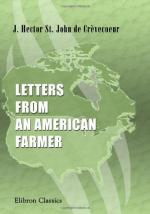who but a few years before was as poor as himself.
This encourages him much, he begins to form some little
scheme, the first, alas, he ever formed in his life.
If he is wise he thus spends two or three years, in
which time he acquires knowledge, the use of tools,
the modes of working the lands, felling trees, etc.
This prepares the foundation of a good name, the most
useful acquisition he can make. He is encouraged,
he has gained friends; he is advised and directed,
he feels bold, he purchases some land; he gives all
the money he has brought over, as well as what he
has earned, and trusts to the God of harvests for
the discharge of the rest. His good name procures
him credit. He is now possessed of the deed,
conveying to him and his posterity the fee simple
and absolute property of two hundred acres of land,
situated on such a river. What an epocha in this
man’s life! He is become a freeholder,
from perhaps a German boor—he is now an
American, a Pennsylvanian, an English subject.
He is naturalised, his name is enrolled with those
of the other citizens of the province. Instead
of being a vagrant, he has a place of residence; he
is called the inhabitant of such a county, or of such
a district, and for the first time in his life counts
for something; for hitherto he has been a cypher.
I only repeat what I have heard many say, and no wonder
their hearts should glow, and be agitated with a multitude
of feelings, not easy to describe. From nothing
to start into being; from a servant to the rank of
a master; from being the slave of some despotic prince,
to become a free man, invested with lands, to which
every municipal blessing is annexed! What a change
indeed! It is in consequence of that change that
he becomes an American. This great metamorphosis
has a double effect, it extinguishes all his European
prejudices, he forgets that mechanism of subordination,
that servility of disposition which poverty had taught
him; and sometimes he is apt to forget too much, often
passing from one extreme to the other. If he is
a good man, he forms schemes of future prosperity,
he proposes to educate his children better than he
has been educated himself; he thinks of future modes
of conduct, feels an ardour to labour he never felt
before. Pride steps in and leads him to everything
that the laws do not forbid: he respects them;
with a heart-felt gratitude he looks toward the east,
toward that insular government from whose wisdom all
his new felicity is derived, and under whose wings
and protection he now lives. These reflections
constitute him the good man and the good subject.
Ye poor Europeans, ye, who sweat, and work for the
great— ye, who are obliged to give so many
sheaves to the church, so many to your lords, so many
to your government, and have hardly any left for yourselves—ye,
who are held in less estimation than favourite hunters
or useless lap-dogs—ye, who only breathe
the air of nature, because it cannot be withheld from
you; it is here that ye can conceive the possibility




